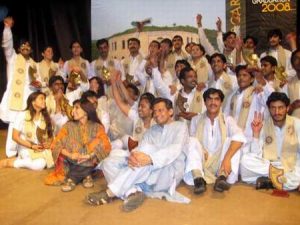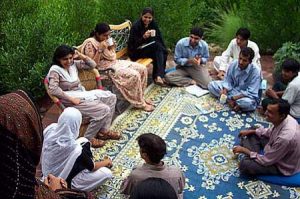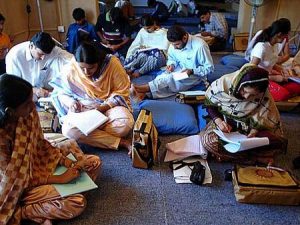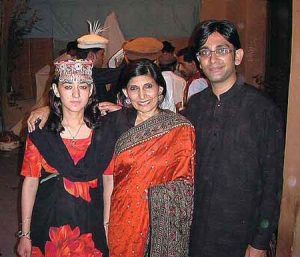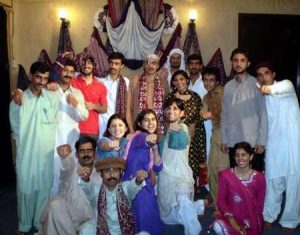
Dr Fouzia Saeed is one of the founding members of Mehergarh, an institute dedicated to transforming the next generation so that they respect human rights and democratic norms. The institute was founded in September 2004 as a Center about an hours drive outside Islamabad, Pakistan. It has training facilities with residential quarters. The Center, Mehergarh, collectively focuses on creating a critical mass of young people who are committed to develop responsible citizenry, progressive leadership and an impetus for collective action. Its approach is embedded in rediscovering and owning the depth and breadth of our diverse culture, which is thousands of years old. We believe that transforming the culture and grounding the initiatives in it is crucial to Mehergarh’s work
Dr Fouzia was more instrumental in setting up an eight week residential leadership training for young people in 2005. This was in her efforts to improve the quality of leadership in Pakistan. She feels very concerned about the unethical and loyalty based leadership of her country, increasingly dominated by feudals, and is committed to bring in young people from all kinds of backgrounds, including the disadvantaged, who have potential to develop and polish their leadership skills. This program then continues to support its graduates in improving their abilities by participating in Mehergarh campaigns and organizing collective activities.
To find out more information on Mehergarh see www.Mehergarh.org
Because of her instrumental role in conceptualizing and conducting the Mehergarh Leadership Camp a brief description of the camp and its glimpses are provided here.
Training Concept
Mehergarh: A Center for Learning organizes an eight week residential training for young men and women with the objective of giving them leadership skills for human rights activism and inculcating democratic norms. The training is open to youth between the ages of 18 – 25 years who have leadership potential. A gender and rural/urban balance is carefully maintained.
The training takes the approach of looking inwards to first reflect upon how we ourselves support the current power imbalances, patriarchy and violation of human rights and then link the personal transformation to the collective pains and injustices in our society, leading towards collective social action. A political understanding of the complexity of our prevailing systems is acquired. Social realities we have constructed around our history, religious roots, gender roles, etc. are examined. It includes an intensive component on social movements and activism skills. This will include insights into local and international social movements as well as use of specific activist techniques.
The trainers are a group of seasoned activists and senior resource persons from the country. Most of the sessions are designed using experiential and interactive methods, catering to the learning needs of youth. Experienced trainers in attitudinal change and self reflection conduct the core sessions.
Keeping the focus on nurturing excellence the number of trainees can not be more than 30. The selection is done at a national level and the criteria for participation is followed strictly. Applications are assessed and candidates are interviewed before the selection is finalized. The approximate ratio between young men and women is targeted to be fifty percent. A similar ratio is intended between urban and rural backgrounds, however so far 80 to 90 participants get selected from the rural backgrounds.
The criteria for selection to this program includes:
- Proven potential of leadership (where the candidate has already mobilized or initiated action as a citizen)
- Progressive outlook (open to new ideas and learning, willingness to challenge realities)
- Commitment and passion to be a part of social change movement
- Age between 18-25 years
Dr Fouzia Saeed has been a part of the selection Committee and is the lead trainer. She lives with the participants on the premises for two months. There is another lead trainer Dr Kamran Ahmad and there are several trainers who come for specific sessions. Dr Fouzia Saeed coordinates the other training sessions and keeps a close tab on the progress each participant is making. Being an experiential program which focuses on attitudinal change and inner transformation it is significant to ensure that every experience, may it be a training session or informal interaction with other participants, becomes a part of the intense learning at Mehergarh. She ensures that learning is drawn from every minute of the living experience, creating and following group norms, work in various committees that they are assigned to and their responses to the diverse group of participants coming from different relegions, ethnicity, social class and provinces.
In addition she takes sessions on Gender, Social Movements, Activism, Strategy building, Tools for social Action and Culture.
The objectives of the human right’s youth leadership training camp are to:
- Make the participants aware of key issues related to human rights and human rights violations
- Develop political understanding of issues like patriarchy, feudalism, etc
- Do self-reflections to explore the connection between personal issues and those of their society.
- Develop capacity to think about human rights issues in a strategic manner
- Build capacity to mobilize and strategize for dealing with human rights issues
- Develop advanced level skills of campaigning lobbying and mobilizing for bringing about social change.
- Build capacity to develop alliances with different stakeholders in order to strengthen the social movement
Future Trainings on Leadership
Mehergarh has now focused on advance leadership courses which are concentrated on a specific theme like ADVOCACY, JOINING THE MAINSTREAM POLITICS, PLURALISTIC DISCOURSE, CAMPAIGNING, SUFISM etc.


